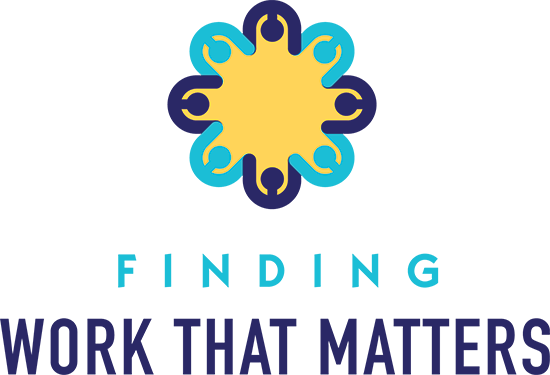What are you doing with your life?
/Recently Elizabeth Gilbert wrote a Facebook posting asking this question and framing it in the definition of 4 words. Hobby. Job. Career. Vocation.
The answers were breathtakingly fresh, offering an important distinction between taking care of basic needs to doing what gives you meaning. She is clear that it is important to understand the differences between each of these aspects of being human. To read her article, check it out here.
The word that I prefer over career is work. Career can be challenging as it is sometimes seen as corporate or one rung on a ladder that has a vague top step. For people whose work is more of a one-stop type, career sounds lofty and unrelatable.
Work, on the other hand, has its roots firmly planted in our history. I saw it in my grandparents' generation. I hardly remember a time when my grandmother was not working. Far into her retirement, she was cooking and gardening and doing temporary jobs. That view of work was passed onto my parents.
What my father and mother impressed upon me was a strong work ethic. They both worked hard. I doubt that my father’s trucking business was his dream career but he gained a good reputation for doing outstanding work. My mother who is 80 this year still works full time in addition to gardening and caring for her home.
When I think of my parents, I think of Fraggle Rock’s doozers, those tiny, green creatures in construction hats and work boots who are happily industrious.
Work ethic is a value that includes
- doing a job well,
- doing what you say you are going to do,
- separating work and personal life, and
- caring about what you are doing.
This value is still central to many workplaces.
The key difference in how the world has changed around work since my parents’ and grandparents’ time is the idea of doing work we love. Previously if you found it, that was a bonus. Now it is more deliberate.
And a bit of a double edged sword. For those who have not found work they love, they feel a pressure to figure it out and a sense of inadequacy for not having done so.
If this is happening for you, knowing the distinction between hobby, job, career and vocation may help. When I encounter people who are struggling with the pressure, I encourage them to explore this further – there is a lot to navigate in this new work world.
In thinking of vocation, I like the term - your life’s work. I first heard the phrase from Laurence G. Boldt, author of How to Find the Work You Love and Zen and the Art of Making a Living.
Your life's work is something you do no matter what. It wouldn’t matter if you got paid or anyone else approved of what you are doing. It is fundamental to who you are.
For example, I think of my life’s work as an archaeologist. I read books on the subject, plan vacations around visiting ruins, and take courses whenever I can. I am drawn to articles written on archaeology. Once I went to a workshop on deciphering Maya glyphs, a subject that far exceeded my knowledge level.
In a way it is how I do my work as a career coach.
What you will notice about your life’s work is:
You want to know more.
- You will be drawn to articles or books or videos on the subject. There will be a natural inclination to learn more and pass the information onto others.
You feel alive.
- When you are doing your life’s work you will feel more engaged in the world.
- You will also find yourself feeling energized – your life’s work fuels you.
It will answer the question: what are you doing with your life?
Or another way of looking at it, doing your life’s work will stop you from asking the question, "what are you doing with your life?"
“Discovering vocation does not mean scrambling toward some prize just beyond my reach but accepting the treasure of true self I already possess. Vocation does not come from a voice “out there” calling me to be something I am not. It comes from a voice “in here” calling me to be the person I was born to be.” Thomas Merton


